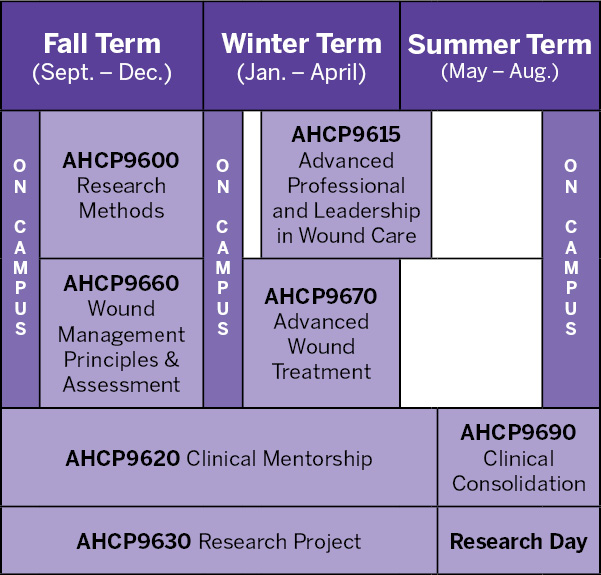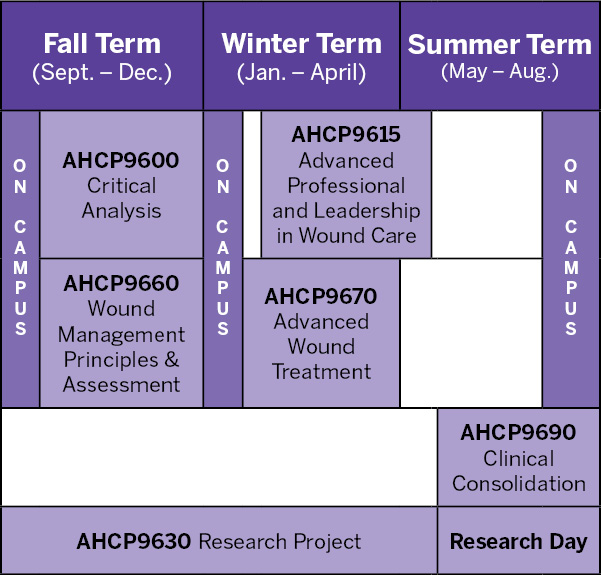Programs
Connect With Us
Email: ahcp@uwo.ca
Apply Online
Applications are submitted online through Western's School of Graduate and Postdoctoral Studies.
Wound Healing
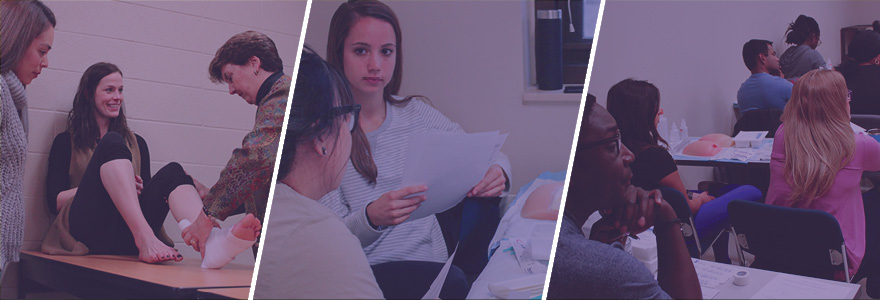
Advance your health care practice
A scientific approach to wound care
Understanding the complexities of many chronic and non-healing wounds can challenge even experienced professionals. The Wound Healing field in the Advanced Health Care Practice master's program provides an advanced education in wound care to health professionals including nurses, chiropodists and physical and occupational therapists.
Experienced health professionals seeking advanced clinical skills in wound care will be able to enhance their clinical practice, and prepare for leadership roles in policy development, research, academia and beyond.
An Evidence-Based Approach
This program is founded on evidence-informed best practices in wound healing, encourages life-long learning in students and fosters the ability to interpret and apply research directly into their clinical practice. Graduates of the Wound Healing program are able to:
- Reliably assess wounds using validated assessment tools
- Identify barriers to wound healing
- Understand how health, biopsychosocial, and personal factors can impact wound healing processes and contribute to delayed or non-healing wounds
- Apply best practice guidelines to prevent, assess, and treat different types of wounds, including diabetic foot ulcers, pressure injuries and venous/arterial leg wounds
Program Features
- Receive one-on-one support and guidance from an experienced mentor during your clinical mentorship
- Gain advanced clinical expertise to assess, plan and implement quality improvement initiatives within your organization and learn to educate others on best practices in wound care
- Learn to apply clinical decision making skills to develop comprehensive and individualized healing plans for patients
- Design and carry-out a group research project and write a publication-ready scientific paper
Interested in learning more about this program?
Complete the form below to get started.
Frequently Asked Questions
Click below for answers to commonly asked questions related to program content, structure and learning outcomes.
Video FAQs
Is this program right for you?
Becoming a leader in wound healing
The value of a clinical master's
About advanced standing
Mentorship
Transform all aspects of your practice in just one year of full-time study
Learn from a combination of facilitated online learning activities, and in-person demonstrations from renowned wound healing experts. Become a leader, problem-solver and advanced health care practitioner. Advance your profession and initiate change around you.
An interprofessional learning environment
This program accepts applicants from diverse professional backgrounds, creating an environment where students learn alongside registered nurses, chiropodists, occupational therapists, physiotherapists, physicians, etc. Throughout the program, students come to understand how wound healing actualizes within their professions and their colleagues’ professions, and share their distinct perspectives with one another.
Upon graduating, they are prepared to recognize opportunities to leverage the perspectives of other health care professionals, and lead collaborative approaches to wound care. Integrated group work projects encourage students to consider and implement opportunities for interprofessional collaboration within their own practice. Through online discussion and during residency periods, students network and create a community of learning with their classmates. These connections among classmates last past graduation, connecting graduates to an interprofessional wound healing network across Canada.
Academics from diverse interprofessional settings are also selected to teach in the program, including infections disease specialists, advanced practice nurses, chiropodists and physical therapists.
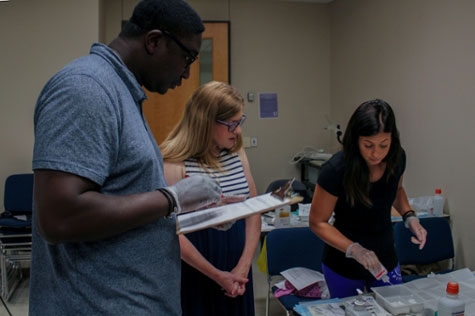
Experiential learning opportunities with top experts in the field of wound healing
On-site residency periods and one-on-one mentorships supplement online coursework, providing the opportunity to learn and receive feedback directly from prominent wound care experts in Canada. This immersive on-campus learning experience allows instructors and students to meet face-to-face, and for students to appreciate how far they have come in their academic journey. Students observe in-class demonstrations by instructors, take part in clinical skills labs, and complete learning activities centered on current research or real case studies that directly translate to practice.
The mentorship component of this program facilitates over 50 different placements across Canada, including in long-term care, hospital, acute care, community or rehabilitation settings. Whenever possible, students will be matched with an experienced wound care expert who is local to them. Over the course of at least 100 hours, students apply wound healing theory to patient interactions, providing a link between academics and clinical practice under the guidance and leadership of an advanced health care practitioner.
Transform your patient care, expand your practice
The Advanced Health Care Practice-Wound Healing program prepares students with the skills to transform their interactions with clients. Specialized training in interprofessional communication, case management and leadership improves patient outcomes and empowers graduates to assume management and policy development roles within a variety of healthcare organizations. Students graduate from this program with advanced professional communication skills, and an enhanced ability to connect with patients, interest groups, colleagues and health care leadership.
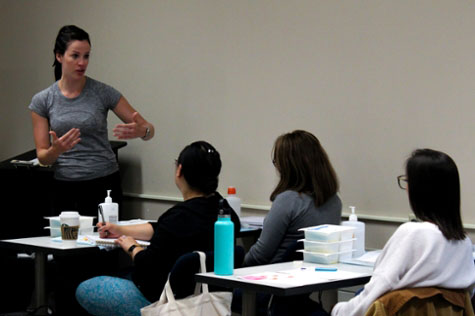
Graduates are equipped to educate and motivate others, from individual goal setting with patients to large group presentations in front of organizational decision makers. Strong communication and advanced leadership skills are essential to many aspects of care, such as developing consultation notes, processes to implement new knowledge into practice or a business plan to measure health quality and cost effectiveness.
In the Wound Healing program, students learn leadership theory as part of their coursework, observe leadership skills in practice throughout residency and mentorship, and apply them within the program through opportunities like peer evaluations, self reflection, and patient interactions.
Experience in appraising research literature, together with improved writing skills, prepares students to contribute to the advancement of the field of wound healing through public education initiatives such as written articles and advocacy.
Lead. Mentor. Advocate.
Students leave the program knowledgeable about up-to-date best practices in wound care, and with the confidence to continue to integrate innovative approaches and research into their own practice. Advanced healthcare practitioners are prepared to foster effective communication and collaboration in interprofessional settings, and advocate on behalf of their clients. Many of our graduates become valuable mentors within their own organizations and communities.
See the bigger picture. Advance your practice.
Graduates from the Advanced Health Care Practice - Wound Healing program obtain a comprehensive understanding of holistic patient-centered care. Students learn to leverage evidence-informed clinical skills together with advanced clinical reasoning to assess and manage patients with complex clinical presentations. They are readily able to identify opportunities for incorporating the expertise of other health care professionals in patient care. This unique advanced clinical program helps students develop strong self-reflection skills needed to assess potential biases and ethical considerations and evaluate their impact on client care.
Program Streams, Structure and Course Offerings
The program focuses on developing specialized clinical and research skills needed to assess and treat people with acute and chronic wounds. Over the course of one year, you will develop strategies for life-long learning and skills to share and apply that knowledge in a variety of health settings. This program is delivered as a combination of online courses, on-campus residency periods and a clinical mentorship. You’ll have the flexibility of self-directed learning with access to our world-class instructors.
Wound Healing Stream
The Advanced Health Care Practice (Wound Healing) program is comprised of 7 online courses - two research courses, three clinical specialty courses and two full-year experiences. There are three intensive residency periods wherein students are required to be on campus at Western. Those periods take place in September, January and July.
Students enrolled in the Wound Healing field must be able to devote 20 to 30 hours per week to program-related activities. While continued clinical practice throughout the program is encouraged, full-time work is not recommended. Students accepted into the program are encouraged to complete summer preparatory activities via an online course site before the September residency period.
Wound Healing Course Offerings
Fall Term (Sept. - Dec.)
AHCP9600: Research Methods & Knowledge
This course is designed to provide participants with an introduction to quantitative research methods, including:
- Basic study design and critical appraisal of studies evaluating the effectiveness of an intervention (randomized trials and observational studies)
- Validity of a diagnostic test
- Identification of risk factors for disease development
- Identification of prognostic factors for disease outcomes
- The quality of a systematic review
AHCP9660: Wound Management Principles and Assessment
This course provides the foundational knowledge and skills needed to optimize the local wound environment and address the needs of people living with acute and chronic wounds. The course uses an in depth understanding of pathophysiological processes involved in tissue repair to guide the assessment of the wound and the patient. It involves applying current best practices to patients with complex wounds to identify and treat infection, consider wound debridement, and treat underlying causes of delayed healing.
AHCP9620: Clinical Mentorship
A minimum of 100 hours of clinical experience will be completed under the supervision of one or more approved mentors in a health care setting that is affiliated with this program and Western University. Whenever possible, mentorship experiences will be based on student preferences, however, this could require additional travel expenses if an appropriate mentor cannot be arranged at a site located near the student’s home. This is a full-year course that is conducted across all three terms of the program (September to June). Students are responsible for securing their own clinical mentor(s).
AHCP9630: Research Experience
Students will be involved in research related to wound healing and appreciate the work required to plan, gather, and analyze original research data. Students will work in a group with an approved program supervisor to prepare an abstract, deliver a poster and podium presentation, and write a scientific paper appropriate for publication in a wound care journal. This is a full-year course that begins in September and culminates in the presentation of the group’s research work during Research Day in July.
On-Campus Residency Period: 2.5 weeks in September
Winter Term (Jan. - April)
AHCP9615: Professionalism and Leadership in Wound Care (January - May)
A course focusing on skills and attributes that promote professionalism and leadership needed for wound care including: advanced clinical reasoning and critical thinking, interprofessional and collaborative practice, business planning, client- centered practice, consultation skills, and the application of knowledge translation principles.
AHCP9670: Advanced Wound Treatment
This course will develop advanced clinical decision making and critical thinking skills needed to assess and manage common types of acute and chronic wounds including pressure ulcers/injuries, venous/arterial leg ulcers, and diabetic foot ulcers. Students will also experience advanced therapies used to enhance wound healing outcomes and practice using sound clinical reasoning to select an appropriate intervention for complex clinical scenarios.
AHCP9620: Clinical Mentorship
See course description above.
AHCP9630: Research Experience
See course description above.
On-Campus Residency Period: 2 weeks in January
Summer Term (May - Aug.)
AHCP9620: Clinical Mentorship
Completion of all requirements of the course by June 30.
See course description above.
AHCP9630: Research Experience
This supervised research experience culminates in the preparation of a research paper suitable for publication in an academic journal and the presentation of results during Research day (schedule in July).
AHCP9690: Clinical Consolidation (Wound Healing)
This course is designed to bring together knowledge, skills, and attributes acquired throughout the year. Clinical competency will be evaluated in a competency-based clinical exam (OSCE) and in a written test where students will demonstrate how and why they would manage complex clinical cases.
Pre-requisites: Successful completion of Wound Healing course (AHCP9660, AHCP9670, AHCP9615) and AHCP9620 (clinical mentorship experience).
On-Campus Residency Period: 1 week in July
Advanced Standing Stream (for NSWOC graduates)
The Advanced Standing stream is designed for nurses who have recently graduated from the NSWOC program. NSWOCs will receive advanced standing for AHCP9620 - Clinical Mentorship and will complete modified version of the other course requirements. Required onsite residency days are also reduced.
Advanced Standing Course Offerings
Fall Term (Sept. - Dec.)
AHCP9600: Research Methods & Knowledge
This course is designed to provide participants with an introduction to quantitative research methods, including:
- Basic study design and critical appraisal of studies evaluating the effectiveness of an intervention (randomized trials and observational studies)
- Validity of a diagnostic test
- Identification of risk factors for disease development
- Identification of prognostic factors for disease outcomes
- The quality of a systematic review
AHCP9660: Wound Management Principles and Assessment
This course provides the foundational knowledge and skills needed to optimize the local wound environment and address the needs of people living with acute and chronic wounds. The course uses an in depth understanding of pathophysiological processes involved in tissue repair to guide the assessment of the wound and the patient. It involves applying current best practices to patients with complex wounds to identify and treat infection, consider wound debridement, and treat underlying causes of delayed healing.
AHCP9630: Research Experience
Students will be involved in research related to wound healing and appreciate the work required to plan, gather, and analyze original research data. Students will work in a group with an approved program supervisor to prepare an abstract, deliver a poster and podium presentation, and write a scientific paper appropriate for publication in a wound care journal. This is a full-year course that begins in September and culminates in the presentation of the group’s research work during Research Day in July.
On-Campus Residency Period: 2.5 weeks in September
Winter Term (Jan. - April)
AHCP9615: Professionalism and Leadership in Wound Care (January - May)
A course focusing on skills and attributes that promote professionalism and leadership needed for wound care including: advanced clinical reasoning and critical thinking, interprofessional and collaborative practice, business planning, client- centered practice, consultation skills, and the application of knowledge translation principles.
AHCP9670: Advanced Wound Treatment
This course will develop advanced clinical decision making and critical thinking skills needed to assess and manage common types of acute and chronic wounds including pressure ulcers/injuries, venous/arterial leg ulcers, and diabetic foot ulcers. Students will also experience advanced therapies used to enhance wound healing outcomes and practice using sound clinical reasoning to select an appropriate intervention for complex clinical scenarios.
AHCP9630: Research Experience
See course description above.
On-Campus Residency Period: 2 weeks in January
Summer Term (May - Aug.)
AHCP9620: Clinical Mentorship
Completion of all requirements of the course by June 30.
See course description above.
AHCP9630: Research Experience
This supervised research experience culminates in the preparation of a research paper suitable for publication in an academic journal and the presentation of results during Research day (schedule in July).
AHCP9690: Clinical Consolidation (Wound Healing)
This course is designed to bring together knowledge, skills, and attributes acquired throughout the year. Clinical competency will be evaluated in a competency-based clinical exam (OSCE) and in a written test where students will demonstrate how and why they would manage complex clinical cases.
Pre-requisites: Successful completion of Wound Healing course (AHCP9660, AHCP9670, AHCP9615) and AHCP9620 (clinical mentorship experience).
On-Campus Residency Period: 1 week in July
Progression Requirements
In order for students to progress in the program, the following requirements must be met on an ongoing basis:
- Students must attain an overall average of no less than 70% on all required courses in the program and no less than 60% in any one course
- Completion of the requirements of the clinical mentorship course including required mentorship hours
- Passing grade on consolidation examinations administered during the summer residency period (July)
- Completion of the supervised research project (minimum 70% of AHCP9630 course requirements)
- Attendance at mandatory residency periods including Research Day in July
Admission and Applying/Tuition and Fees
All applicants must meet the following general requirements, in addition to the specific requirements outlined below.
- A minimum bachelor's degree from a recognized university and at least a (B) standing (or equivalent) over the final two years of the program
- Advanced computer skills
- Two references
- Academic (if attended university within the last five years) and professional
- Demonstrated English language proficiency, including both written and oral communication
- See below for more information
- Be a licensed/regulated health care professional with Canadian licensure from a discipline related to wound care (e.g., nurse, physical therapist, occupational therapist, chiropodist, dietitian)
- Show evidence of at least two years clinical experience
Information about mentorship requirements, including pre-placement requirements, will be provided to students once they are admitted to the program and prior to the beginning of classes.
Supplemental Application Materials
In addition to completing the online application, applicants are required to submit the field-specific supplemental materials outlined below. It is the responsibility of the applicant to ensure that all supplemental application materials are uploaded as part of their online application.
Applicants to the Wound Healing program are required to submit the following supplemental requirements as part of the application:.
- CV/Resume
- Provide information on education, clinical and other experience
- Writing Sample
- Provide a succinct (2000-word/5-page maximum) paper written independently by the applicant about the current status and future directions of "Wound Care and Skin Health in Canada"
- Supplemental Questionnaire
English Language Proficiency
- Applicants whose first language is not English must provide evidence of their proficiency in the use of the English language by a satisfactory achievement within the last two years in one of the following:
- The Test of English as a Foreign Language (TOEFL). The minimum acceptable score is 105 (internet-based test); 620 (paper-based test); 260 (computer-based test). [Western's TOEFL ID is 0984].
- The International English Language Testing Service (IELTS Academic). The minimum acceptable score is 7.5 out of 9.
- The Duolingo English Test. The minimum acceptable score is 135.
- Applicants who are required to present evidence of proficiency in English must make their own arrangements to complete one of the above tests or programs and to have the official results sent directly to SGPS by the testing agency.
- The English language proficiency requirements outlined above do not apply to students from Quebec
Applying to the Program

Have questions about applying?
Email ahcp@uwo.ca.
To apply to the Wound Healing program, students should:
- Visit the online application website
- Follow the instructions on that page to access the application
- Select "Advanced Health Care Practice MClSc" from the program options in the application and select the appropriate field
Application Deadline
- Applications are currently open and will close on June 30th, 2026 for domestic applicants intending to start in September 2026.
Tuition and Fees
The annual domestic tuition fee for this program is approximately $14,000 CAD including ancillary fees (plus $2,100 CAD mentor fee i.e. $700 CAD/term***) which is payable over three terms (September, January and May), plus course fees payable in the Fall term.
The annual international tuition fee for this program is approximately $37,000 CAD including ancillary fees (plus $2,100 CAD mentor fee i.e. $700 CAD/term***) which is payable over three terms (September, January and May), plus course fees payable in the Fall term.
In addition, there is a $300 CAD course fee to cover supplies, which is payable in the Fall term.
These fees are subject to change and are set by Western University. Instructions for students paying tuition from a Canadian bank are available from the Office of the Registrar.
***Please note all fees including mentorship fees and course fees are currently under review and are subject to change and adjustment***
Frequently Asked Questions
About Admission & Application
I have not been in school for a while, what if I can’t acquire two academic references?
Students who have not been in school for more than five years may use a person who is not affiliated with a university (non-academic) reference for one of their letters.
What happens if I apply on time, but my references or transcript aren't available until after applications close?
- Applications will not be considered by the admission committee until they are complete
- After the application deadline, the limited spots that are available in the program will be filled by students who have provided complete applications
- Students are strongly encouraged to have applications complete at least two weeks prior to the deadline to allow sufficient time for other requirements (transcripts, reference letters) to be delivered
Have you received a complete application from me?
Students may contact the AHCP Program Assistant ( ahcp@uwo.ca) at any time to check on the status of an application.
When can I expect to hear whether I have been accepted into the program?
The admission committee will review completed application files beginning mid-March each year. This committee makes recommendations for admission to the School of Graduate and Postdoctoral Studies (SGPS), which reviews required documents to confirm all requirements. Provided all requirements have been met, SGPS will send out a letter of offer of admission by email to the applicant directly. This typically occurs in late May
About Eligibility
Am I eligible to apply if I don’t have two years of clinical experience?
Students can still apply but the admission committee does consider the amount of clinical experience as a criteria for selecting successful applicants.
What constitutes advanced computer skills?
The Advanced Health Care Practice program is a course-based graduate program with many of the required courses delivered using online learning tools. Courses are comprised of several modules each of which include resources (readings, lecture notes, etc.), and learning activities (structured discussions, scheduled teleconferences, assignments, or quizzes). An orientation on how to access and use many of the online learning tools will be provided during the first residency period.
Am I eligible to apply as an international student?
Admission is not offered to international students. All applicants must be licensed health care professionals in Canada.
Am I eligible to apply if I am a Canadian graduate working abroad?
A requirement of this program is that students must complete clinical mentorship hours at an approved clinical site. This requires students to have current registration with the appropriate College and have malpractice insurance that is applicable to their chosen clinical site(s).
Students with advanced standing who are not required to take the clinical mentorship course (eg. specialized wound care courses and experiences) may request special consideration to enter the program.
Am I eligible to apply if I can’t attend in-class sessions at Western?
It is mandatory for students to attend the on-site residency periods on Western’s campus. If you are unable to attend, you will be required to withdraw from the program.
About Fees
Are there any additional fees outside of tuition for the school year?
All AHCP students pay the same graduate fees. Those students involved in the mentorship program, are levied a fee in addition to graduate fees.
Other FAQs
If English is not my first language, what do I need to do?
Applicants whose first language is not English must provide evidence of English language proficiency; the TOEFL or an IELTS is recommended. A minimum TOEFL score of 620 (paper-based), 105 (internet-based), 260 (computer-based) or an IELTS score of 7.5 is required.
Students who, after admission, show an inadequate command of spoken or written English must improve their proficiency to the satisfaction of the Facutly of Health Sciences.
Students may be asked to withdraw from the program if their command of English interferes with their ability to provide quality professional services.
Students who are required to present evidence of proficiency in English must make their own arrangements to write the TOEFL and to have the official results sent directly to the School of Graduate and Postdoctoral Studies.
How do I provide proof of Malpractice Insurance?
Please bring a copy of your Malpractice Insurance with you on the first day of orientation.
Can I access computer resources after class hours?
Students have access to Elborn College and the computer labs at all times during residency periods.
How much time should I expect to devote to the program?
Students must be registered as full-time graduate students in the AHCP program. Students are encouraged to continue to work clinically (part-time) during the program in order to be able to incorporate new knowledge and skills into their clinical practice.
Students can expect to devote at least 20 – 30 hours/week to program related activities (i.e. studying, reading, assignments etc).





